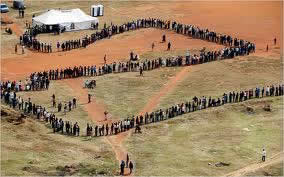
On February 28, the Council on African Studies hosted a full-day conference on “Corruption, Accountability and Governance in Africa.” The conference was organized and moderated by Susan Hyde (Yale) and Elizabeth Carlson (Yale). The panelists included academics from a variety of social science fields, development practitioners, and journalists. At least 150 Yale students, faculty, and members of the public attended, many of whom were able to ask questions of the panelists.
In light of the large number of African elections that have already or will soon take place, the first panel addressed the quality of recent African elections, and the implications of these elections for accountability. Daniel Smith (University of Florida) raised concerns about biometric registration, which is designed to prevent voter fraud, but may actually contribute to electoral malfeasance by suppressing votes, or by simply breaking down. This argument proved prescient in the Kenyan election that took place on March 5 amid malfunctioning machines and claims of tainted votes. Providing examples from a wide variety of recent African elections, Mark Billera (USAID) and Richard Klein (NDI) argued that while elections are not often overtly rigged, they are also not fair: Opposition parties are suppressed and incumbents can use greater access to resources to directly buy votes. Finally, Michael Bratton (Michigan State), who founded the Afrobarometer Survey, used survey data to demonstrate that many Africans, though they support elections, do not yet believe it is the role of the voters to hold politicians accountable: In this context, even the fairest elections may not lead to accountability.
The second panel addressed the provision of critical government services such as education and health care, from which money is often lost to corruption. Guy Grossman (University of Pennsylvania) argued that decentralization reforms in Uganda, which are theorized to increase accountability by placing leaders closer to their constituents, are very politically popular, but also unsuccessful: Units proliferate until they are too small to have either influence with the center or the capacity to provide the necessary services. Kennedy Opalo (Yale ’09), now a Stanford graduate student, presented evidence that neither decentralization, nor informing citizens of their politicians’ wasted funds, was enough to curb the waste in Kenya. Andrew Zeitlin (Georgetown) presented somewhat more positive results, showing that Ugandan communities work together to design their own school “report cards”; they are able to continue cooperating to enforce teacher attendance and better test scores.
The final panel addressed “the resource curse” that follows oil discoveries—a particularly important topic due to recent independence of oil-rich South Sudan, discoveries of major oil reserves in Ghana and Uganda, and active oil exploration in a number of other countries. Carl LeVan (American) provided thorough political history of oil in Nigeria, emphasizing the conditions that have led to corruption and conflict in the Niger Delta. Juan Carlos Quiroz (Revenue Watch) presented a brand-new dataset on transparency in the natural resource sector and showed that, with the exception of Botswana, African countries do not provide adequate information to either the international community or their own citizens about their deals with international companies or the amount of revenue the government is earning from these resources. Finally, Angelo Izama, a Ugandan journalist and writer, provided a closing address linking lack of transparency in the resource sector to a lack of rule of law more generally, including the political imprisonment of activists, suggesting that the existing institutional environment is more important to transparency than is oil itself.
